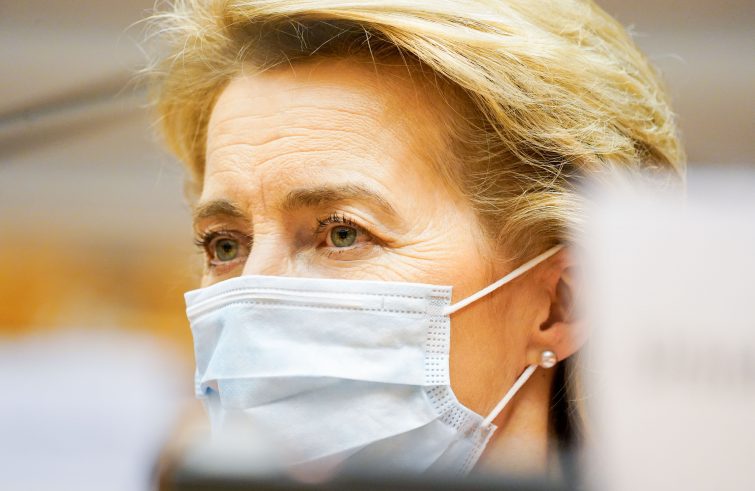
“A turning point for Europe”; “a proposal to be carefully examined”; “many promises, all of which must be kept.” The reactions to the plan to revitalize EU economy, brought to its knees by the coronavirus, are – as could be expected – very different depending on whether one is rooting for the Union or not, whether one lives in a country in the north or south of Europe, or in regions more or less devastated by the pandemic. The proposal presented to the European Parliament on Wednesday 27 May by Ursula von der Leyen is in many ways a novelty. In fact it calls on the Member States to join forces, acting quickly and with ‘firepower’ commensurate with the gravity of the situation. In accordance with the principle of solidarity, inscribed in the DNA of the Union and long neglected in European policy (no less than in national policy).
Words and numbers. “The recovery plan turns the immense challenge we face into an opportunity, not only by supporting the recovery but also by investing in our future: the European Green Deal and digitalization will boost jobs and growth, the resilience of our societies and the health of our environment. This is Europe’s moment. Our willingness to act must live up to the challenges we are all facing”, declared Ursula von der Leyen presenting the Next Generation EU plan, due to be examined by the European Council on 19 June with a view to obtaining – not an easy task – a unanimous green light from the EU-27 governments. The proposal issued by the Council will then be submitted to the European Parliament for final approval.
The plan illustrated by the President of the Commission amounts to € 750 billion (€ 500 billion in free grants, 250 billion in repayable loans), in additn to € 1,100 billion of the Union’s Multiannual Financial Framework 2021-2027 ” totalling € 1,850 billion.”
Furthermore, Von der Leyen explained, if to this sum is added the Eurogroup’s €540 billion package (ESM, EIB and SURE) the total sum amounts to almost €2,400 billion. Not surprisingly, EUR750 billion proposed by Von der Leyen is a sum ranging between € 500 billion proposed by Merkel-Macron and € 1,000 billion discussed over the past few weeks, which the European Parliament had hoped for as a minimum sum.
Three key priorities. Von der Leyen stressed that this is a “pact” to address, together the “massive recession” resulting from the Covid-19 pandemic. It’s necessary, she said, to “restart with a sustainable, green, digital economy, where the Single Market plays an essential role.” If implemented, the proposal has the potential to change the face of Community economy – “to ensure the recovery is sustainable, even, inclusive and fair for all Member States.” “The coronavirus has shaken Europe and the world to its core, testing healthcare and welfare systems, our societies and economies and our way of living and working together.” She pointed out: “To protect lives and livelihoods, repair the Single Market, as well as to build a lasting and prosperous recovery, the European Commission is proposing to harness the full potential of the EU budget.” The “Next Generation” Europe illustrated by the President of the European Commission to MEPs, envisages a set of “pillars” and interventions, namely an increased EU budget, EU own resources, mobilizing public investment – backed up by reforms at national level – which in turn generates private investment.
Funds must be directed to three key areas of need: supporting Member States with investments and reforms: re-launching the real economy, with a strong focus on innovative, sustainable and digital sectors; “learning from the crisis.”
The extensive Next Generation EU document clearly illustrates what the Commission sees as a means of building on what has been happening: modernizing health systems; stepping up civil protection; allocating more money to research (Horizon); and strengthening relations with international partners, including through common foreign policy. But the primary and short-term concern remains businesses, productive sectors and employment.
EUR171 billion to Italy. Reactions in Brussels and European capitals reflect different political realities and prevailing national interests. For the Commissioner for Economic Affairs, Paolo Gentiloni, the plan is “a European breakthrough to tackle an unprecedented crisis.” Italian Prime Minister Giuseppe Conte is satisfied: “an excellent signal from Brussels, it goes in the direction indicated by Italy. We have been described as visionaries because we believed in it from the start. 500 billion in grants and 250 billion in loans are an adequate amount. Now let’s speed up the negotiation and free up the resources soon.” According to calculations yet to be confirmed in detail, Italy is estimated to receive approximately €171 billion, €90 billion in loans and €81 billion in grants.
“We must act quickly.” In favour of the proposal – albeit to varying degrees – also Angela Merkel (Germany), Pedro Sanchez (Spain), Emmanuel Macron (France); some doubts (and some timid openings) from Northern countries, including “frugal” governments (Dutch Prime Minister Mark Rutte warned that it will be “a long negotiation”). Some praise came from Central and Eastern Europe. Positions are indeed distant, and in the coming weeks it will be necessary for the Commission to clarify every aspect of the plan, while the President of the European Council, Charles Michel, will have to resort to considerable diplomatic skills to mediate between the governments. Michel said: “This is an important step in the decision making process. It will help target support towards the sectors and regions most affected by the COVID19 pandemic.” The Belgian politician hopes “to reach an agreement before the summer break”, for “our citizens and businesses have been heavily impacted by the pandemic. They need targeted relief without delay.”















